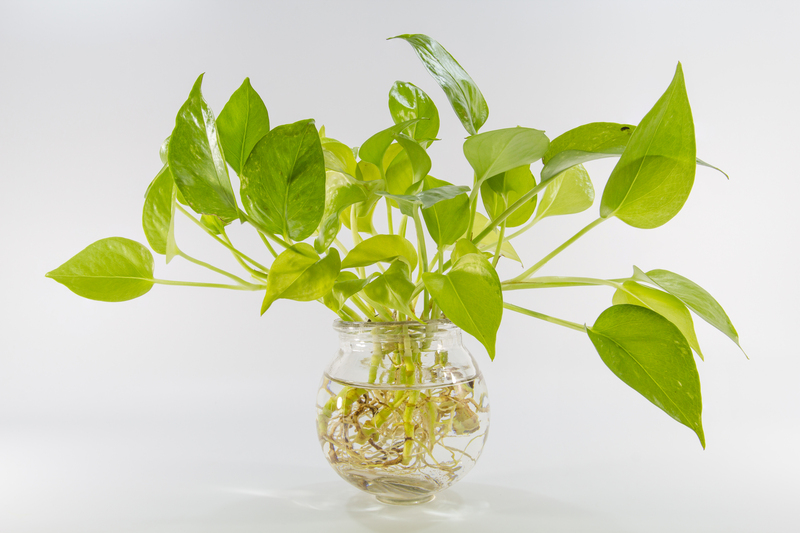Nutrient-Packed Soil Born from Organic Waste
Posted on 27/06/2025
Nutrient-Packed Soil Born from Organic Waste: Transforming Trash to Treasure
The shift towards sustainable agriculture and eco-friendly gardening has ignited interest in nutrient-rich soil created from organic waste. This innovative approach not only diverts waste from landfills but also produces fertile, robust soil that can transform gardens, farms, and landscapes. In this in-depth article, you'll learn how organic waste becomes powerful, nutrient-packed soil, the science behind it, practical steps to create it, and why it matters for a greener world.

What is Nutrient-Packed Soil Born from Organic Waste?
Nutrient-dense soil produced from organic waste refers to the rich, fertile earth derived from the decomposition of natural matter such as food scraps, leaves, and yard trimmings. Through processes like composting and vermicomposting, organic materials are broken down by microorganisms and invertebrates, creating a dark, crumbly substance teeming with plant-friendly nutrients. This soil not only supports healthy plant growth but also improves soil structure, moisture retention, and long-term sustainability.
Core Benefits of Soil Made from Organic Waste
- Enriches Soil - Boosts content of vital plant nutrients (nitrogen, phosphorus, potassium, micronutrients)
- Promotes Sustainable Gardening - Reduces reliance on synthetic fertilizers and recycles resources
- Improves Soil Structure - Encourages aeration, drainage, and root penetration
- Increases Water Retention - Organic matter enhances soil's capacity to hold moisture
- Reduces Waste - Diverts organic matter from landfills, lowering greenhouse gas emissions
The Science Behind Creating Fertile Soil from Organic Waste
Understanding how nutrient-packed soil is born from organic waste helps you unlock its potential for your own use. The process is rooted in natural decomposition -- aided by bacteria, fungi, earthworms, and beneficial insects. Here's how it works:
Key Decomposition Processes
- Composting - The aerobic (oxygen-rich) breakdown of organic materials produces heat that destroys pathogens and seeds while preserving nutrients.
- Vermicomposting - Red wigglers and other earthworms consume organic waste, excreting castings that are rich in readily available nutrients and beneficial microbes.
- Bokashi Fermentation - An anaerobic (oxygen-free) method using specific microbes for rapid pre-composting, ideal for food scraps and sensitive organic materials.
Over several weeks to months, these processes convert kitchen scraps, leaves, coffee grounds, and other biodegradable waste into nutrient-packed soil conditioners and mulch, commonly known as compost.
Organic Waste: The Building Blocks of Nutrient-Packed Earth
The secret to fertile soil generated from organic waste lies in the diversity and balance of inputs. The best compost blends 'browns' (carbon-rich materials) and 'greens' (nitrogen-rich materials) in the right proportions to fuel decomposition and nourish your garden.
Best Organic Waste Materials for Composting
- Kitchen Scraps: Vegetable peels, fruit rinds, coffee grounds, tea leaves, eggshells
- Yard Waste: Grass clippings, leaves, twigs, garden trimmings, plant prunings
- Paper Goods: Unbleached napkins, paper towels, shredded newspaper, cardboard
- Other: Sawdust (from untreated wood), wood chips, spent flowers
Avoid composting meat, dairy, fats, or diseased plants, as these can attract pests or spread pathogens.
Step-by-Step Guide: How to Produce Nutrient-Rich Soil from Organic Waste
Want to start making nutrient-packed compost soil at home or on your property? Here's an easy-to-follow process:
1. Select Your Composting Method
- Aerobic Composting: Use a pile, bin, or tumbler. Ideal for most gardens. Turn regularly to aerate.
- Vermicomposting: Set up a worm bin indoors or outdoors for kitchen scraps. Red wigglers transform waste into castings.
- Bokashi: Utilize a sealed bin and bran inoculated with beneficial microbes to ferment food waste.
2. Build Your Compost Pile
- Layer greens and browns to balance nitrogen and carbon (aim for a ratio of roughly 1:2).
- Add moisture (damp sponge consistency) to kickstart microbial activity.
- Allow airflow to prevent bad odors and support aerobic bacteria.
3. Maintain and Monitor
- Turn or mix the pile every 1-2 weeks for even decomposition.
- Keep the pile moist, but not soggy.
- Observe temperature. A hot pile (120-150?F) means microbes are working!
4. Harvest Your Nutrient-Packed Compost Soil
- In 2-6 months (depending on method), finished compost looks dark, crumbly, and smells earthy.
- Sift to remove large bits; use as garden mulch, soil amendment, or even houseplant boost.
Tip: Regularly adding organic kitchen and garden waste keeps your compost system producing nutrient-loaded soil year-round!
Soil Health Benefits of Nutrient-Dense Compost from Organic Waste
Soil enriched with composted organic waste goes beyond providing the basics. It initiates a thriving ecosystem underground, with profound long-term effects, including:
- Boosted Soil Microbial Activity: Beneficial microbes flourish, enhancing nutrient cycling and plant disease resistance
- Enhanced Soil Structure: Crumbly organic matter binds minerals into aggregates, resisting compaction
- Natural Fertility: Slow-release nutrients minimize risk of leaching and nourish crops over time
- Erosion Prevention: Organic-rich soil binds together, protecting the land from wind and water erosion
- Improved Plant Health: Strong soil supports disease-resistant, robust plants with higher yields and better flavor
A teaspoon of compost-rich soil can contain up to a billion microbes, each playing a role in sustaining vibrant plant life.
Environmental Impact: From Organic Waste to Sustainable Soil
The creation of nutrient-packed soil born from organic waste is a win-win for both gardeners and the environment. Here's why:
- Cuts Greenhouse Gas Emissions: Composting diverts waste from landfills, avoiding the production of methane, a potent greenhouse gas.
- Reduces Need for Chemical Fertilizers: When organic waste is turned into fertilizer-rich soil, reliance on synthetic inputs drops.
- Supports Circular Economy: Organic waste becomes a resource, closing the loop and reducing the ecological footprint.
- Protects Waterways: Healthy soil reduces runoff, keeping nutrients on land and preventing water pollution.
Practical Applications: Using Nutrient-Packed Soil in Gardens, Farms, and Urban Areas
Soil crafted from composted organic waste can be applied almost anywhere plants grow. Here are some top uses:
- Vegetable Gardens: Blend compost into beds before planting, or use as mulch around crops.
- Flower Beds and Lawns: Spread compost to enrich soils before seeding or overseeding.
- Urban Green Spaces: Revitalize parks, roadside plantings, and community gardens with organic compost.
- Houseplants: Add 10-20% compost to potting soil for natural nourishment indoors.
- Farm Fields and Orchards: Large-scale compost applications restore overworked soils and boost yields sustainably.
How Much Compost Should You Use?
- General garden use: Work in 1-2 inches of compost into the top 6 inches of soil annually.
- Lawns: Apply a thin 1/4 - 1/2 inch topdressing in spring or fall.
- Outdoor containers: Mix 10-20% compost with potting media.
Remember: While compost is powerful, balance is key - too much can overwhelm tender roots!

The Future of Fertile Soil: Adopting Organic Waste Recycling Worldwide
With increasing awareness of environmental challenges, nutrient-rich soil made from organic waste is poised to play a major role in global agriculture and landscaping. Municipal composting programs, community gardens, and even vertical farms are harnessing waste-to-soil systems to restore degraded land and grow nutritious food.
Innovative Trends in Organic Waste Composting
- Smart Compost Bins: Digitally monitored bins ensure optimal conditions and faster results.
- Commercial-Scale Compost Facilities: Cities are rolling out organics recycling to handle food waste from homes and businesses.
- Onsite Composting in Schools and Offices: Local composting builds community and awareness among future generations.
- Soil Remediation Projects: Compost restores contaminated land, making it safe for new uses.
Conclusion: Embrace the Power of Nutrient-Packed Soil from Organic Waste
Turning organic waste into fertile, nutrient-packed soil is not just an eco-friendly trend--it's a timeless solution for building resilient landscapes and sustainable food systems. By harnessing the natural power of composting, nutrient-dense soil born from organic waste supports healthy crops, lush gardens, and a cleaner planet for future generations.
Start your composting journey today and witness the transformation - from scraps to soil, from waste to abundance.
Latest Posts
A gardener's guide to dynamic container planting
Create Lasting Memories with a Family-Centric Yard
The Art of Orchid Care: Secrets for Success
Defending Your Plants Against Frost: Winter Gardening Insights

